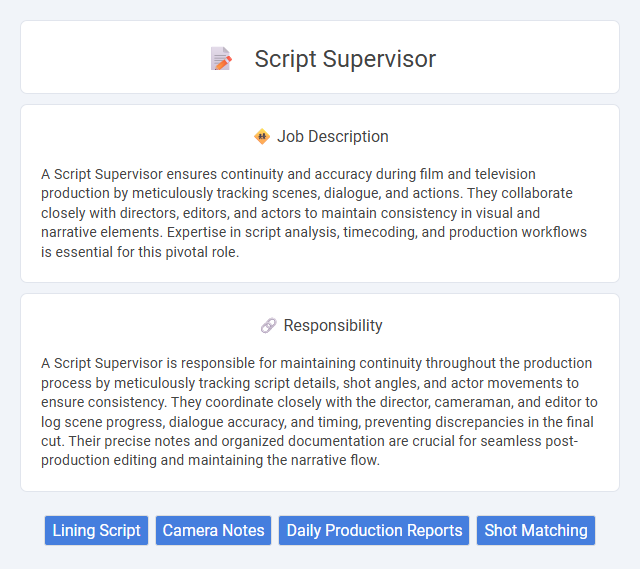
A Script Supervisor ensures continuity and accuracy during film and television production by meticulously tracking scenes, dialogue, and actions. They collaborate closely with directors, editors, and actors to maintain consistency in visual and narrative elements. Expertise in script analysis, timecoding, and production workflows is essential for this pivotal role.
Individuals with strong attention to detail and excellent organizational skills are likely to excel as Script Supervisors, given the job's demand for meticulous continuity tracking and detailed note-taking. People who thrive in high-pressure environments and possess effective communication abilities may find this role suitable due to the constant coordination with directors, actors, and production teams. Those who struggle with multitasking or prefer less structured work schedules may find the demands of a Script Supervisor challenging to manage successfully.
Qualification
A Script Supervisor must have a keen eye for detail and strong organizational skills to track continuity, script changes, and scene progression during film production. Proficiency in industry-standard software like Final Draft and Movie Magic Scheduling is essential, along with excellent communication skills to coordinate between directors, editors, and production teams. A background in film studies or production, combined with experience on set, enhances the ability to maintain narrative consistency and support efficient workflow throughout the shoot.
Responsibility
A Script Supervisor is responsible for maintaining continuity throughout the production process by meticulously tracking script details, shot angles, and actor movements to ensure consistency. They coordinate closely with the director, cameraman, and editor to log scene progress, dialogue accuracy, and timing, preventing discrepancies in the final cut. Their precise notes and organized documentation are crucial for seamless post-production editing and maintaining the narrative flow.
Benefit
A Script Supervisor likely enhances film production by ensuring continuity and accuracy in dialogue, actions, and scenes, which can significantly reduce reshoots and save time. They probably improve communication between the director, camera crew, and editor, leading to a smoother workflow and higher-quality final product. Their meticulous attention to detail often benefits overall project efficiency and consistency.
Challenge
Script Supervisor roles likely involve the challenge of maintaining continuity across various scenes, which requires detailed attention to dialogue, actions, and timing. Managing multiple takes and ensuring consistency under tight schedules may pose significant pressure. The job probably demands quick problem-solving skills to address unexpected script changes or discrepancies during filming.
Career Advancement
Script Supervisors play a critical role in film and television production by maintaining continuity, tracking script progress, and coordinating between departments. Mastery of script supervision opens pathways to senior production roles, such as Assistant Director or Production Manager, leveraging in-depth understanding of shooting schedules and technical details. Continuous skill development and experience on diverse projects enhance prospects for higher responsibilities and leadership positions within the production hierarchy.
Key Terms
Lining Script
A Script Supervisor plays a crucial role in film and television production by meticulously creating and maintaining the Lining Script, which visually tracks camera shots and movements alongside the dialogue and action. The Lining Script ensures continuity by marking camera angles, scene coverage, and timing, enabling editors to assemble footage seamlessly during post-production. Precise documentation within the Lining Script reduces reshoots, maintains narrative consistency, and supports effective communication among directors, cinematographers, and editors throughout the production process.
Camera Notes
Script Supervisors play a crucial role in film production by maintaining detailed camera notes that ensure continuity and consistency throughout shooting. These notes include lens types, camera angles, shot sizes, movements, and focus adjustments, which are vital for post-production synchronization and editing accuracy. Precise camera documentation helps directors, cinematographers, and editors maintain visual coherence and match shots seamlessly during the editing process.
Daily Production Reports
Script Supervisors play a crucial role in creating accurate Daily Production Reports, detailing each scene's continuity, camera angles, and take numbers. These reports ensure seamless communication between departments by documenting shooting progress, actor movements, and script changes. Effective Daily Production Reports help maintain schedule adherence and budget control throughout film production.
Shot Matching
The Script Supervisor plays a crucial role in shot matching by meticulously tracking continuity across scenes to ensure seamless visual and narrative flow. They record detailed notes on framing, camera angles, actor movements, and dialogue delivery, enabling consistent alignment between shots during editing. Accurate shot matching minimizes reshoots and maintains the film's immersive quality, making the Script Supervisor essential for continuity management on set.
 kuljobs.com
kuljobs.com